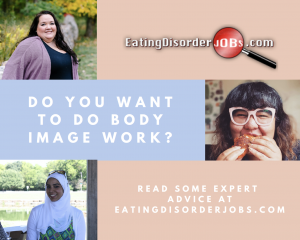Body image training should be a part of all of our education but some individuals have gone above and beyond to turn body image into a career. These experts are so important in our field and offered up some great advice to those hoping to follow in their footsteps.

“Throughout our careers, we’re taught to be helpers but not to think like business people. My advice would be to work toward a career that allows for financial freedom and offers continuing education to think like a business person. Living my passion by helping others and having financial freedom has been an incredible experience.” – Bri Campos
“The ED professional world needs critical approaches. It needs queer people, BIPOC, disabled people, fat people, working class people, trans and NB people. The ED space isn’t just clinicians. It’s podcasters, it’s educators who teach people how to create environments that don’t trigger people, it’s writers, it’s editors, it’s influencers, it’s parenting experts, it’s entrepreneurs. So, trust your gut, figure out how to incorporate ED into what you’re good at and what you love, expect pushback when you’re onto something powerful, be an early adopter, shake things up and follow the need not the rules. I remember being in grad school and my advisor saying that pursuing a career centered around fat people was “career suicide.” I’ve published three books and speak all over the country on this topic. Wow, was she wrong. There is so much room for innovation in the ED space! I think about the fact that the ED world is just beginning to understand that disordered eating is connected to weight stigma. This is so mind blowingly obvious, and yet it took decades to get here because the right people either weren’t in the room or they weren’t speaking their minds. The world of ED treatment has the potential to look totally different within a few decades. Be part of that shift. Listen to your intuition when you think about what’s working and what’s not, and instead of giving up or giving in, find the allies and the resources you need to make changes that help people.” – Virgie Tovar
“It can be very intimidating to go against the grain, once you start unpacking weight stigma — especially when so many educational institutions and health service providers do not practice in ways that respect and protect all bodies. So be that person who speaks up. Set boundaries. Have difficult conversations and have them unapologetically. You will get better at it with time.” – Fatmah H. Al-Qadfan, Registered Drama Therapist
- “Network, find professionals in your area and reach out to them. Take them out to coffee, meet with them at their office, volunteer, attend chapter meetings. It’s a good way to see to see what your day to day life could look like and it’s always encouraging to have support and colleagues who share similar values.
- Attend conferences, read books, seek knowledge. There are so many wonderful resources out there, get your hands on them.
- Get a supervisor/mentor. Seeking support from a supervisor/mentor is invaluable and can really help you navigate cases by seeing them from a different perspective. Supervisors can provide a safe place to be able to discuss day to day challenges.
- Make mistakes and learn from them. No one is perfect, mistakes happen and when they do acknowledge them, discuss them in supervision, and move on.” – Malak Saddy RD, LD, CEDRD
“I would tell any new therapist that it takes time to feel comfortable and to be okay with asking for help. No one is perfect and we all need mentors, colleagues and supervisors to help us along the way. I would say to be persistent in pursuing what you want. I would also say that social work and counseling is very emotionally draining if you aren’t taking care of yourself. As practitioners, we must model good self care and self love by putting our needs first.” – Catie Lynch, LCSW
Check out these experts’ full interviews at https://eatingdisorderjobs.com/category/advice-from-experts/ and search the right column for their name.
